Making Learning Less Remote: The 2021 Derek C. Bok Awards
GSAS students recognized for outstanding teaching in a pandemic year
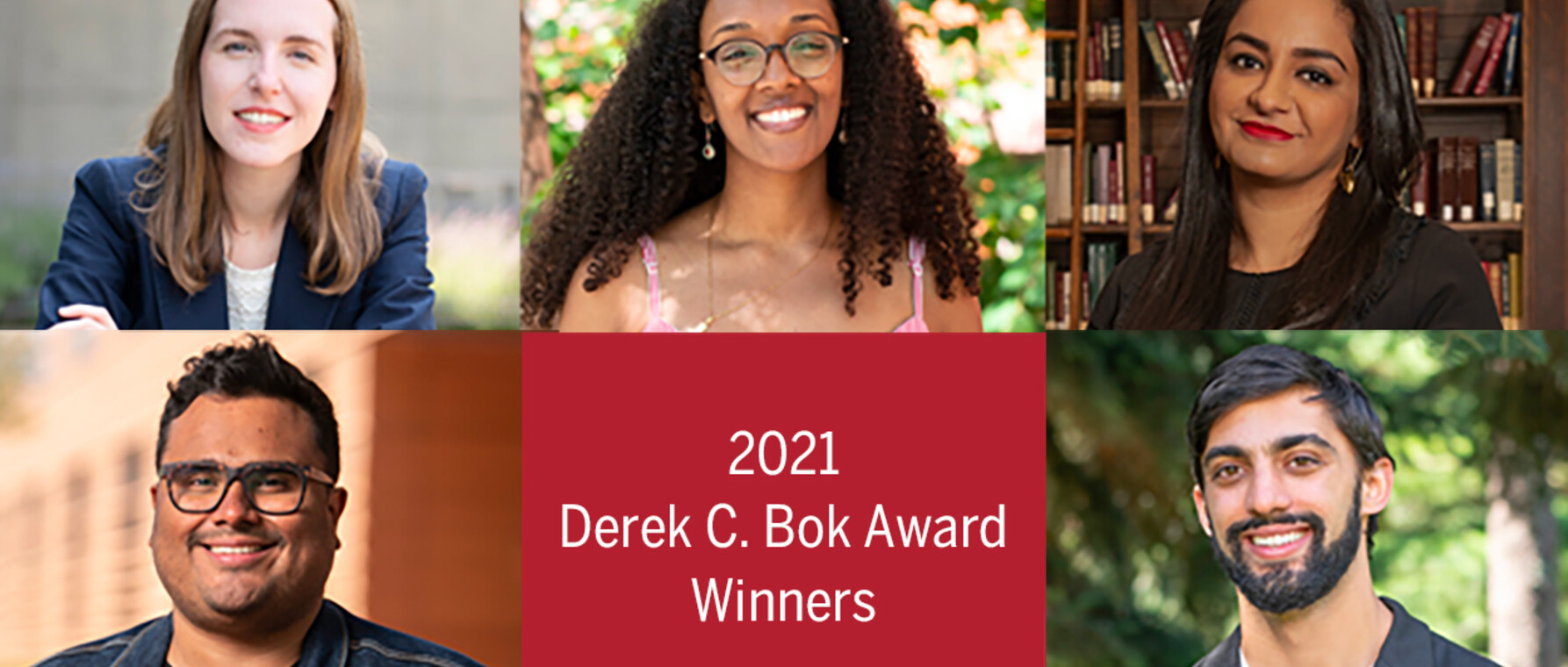
As in years past, GSAS in spring 2021 recognized five outstanding teaching fellows (TFs) with the Derek C. Bok Award for Excellence in Graduate Student Teaching of Undergraduates.
Last year, however, was not like years past.
With campus de-densified and students scattered across the world as part of the University’s response to the COVID-19 pandemic, TFs were confronted with daunting pedagogical challenges: to make material come alive across a string of seemingly endless Zoom meetings; to forge bonds with their students—and help students forge bonds with one another; and to enable undergraduates to stay focused and succeed during a global health crisis.
The 2021 Derek C. Bok Award winners rose to these challenges time and again during the 2020-2021 academic year. They helped faculty redesign courses for remote learning platforms. They enabled students to create home laboratories. They made themselves available at all times of the day and night to accommodate students in different time zones and keep them engaged with the subject matter. They listened actively and compassionately to students’ questions and concerns. In so doing, they brought students a little closer to the classroom experience during a year when learning was remote.
For this extraordinary work, the winners of the 2021 Bok Awards—made possible thanks to an endowment established by David G. Nathan ’51, MD ’55, the Robert A. Stranahan Distinguished Professor of Pediatrics at Harvard Medical School, and his wife Jean Louise Friedman—received a $1,000 prize and a certificate bearing the citations below.
Kirsten Burke: Infectious Knowledge and Passion
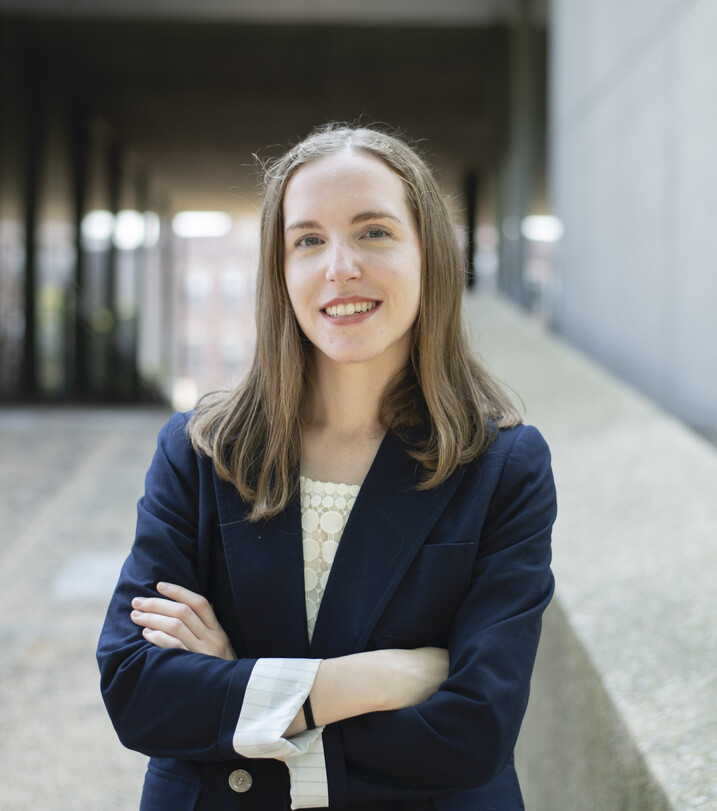
Kirsten Burke, a PhD candidate in the History of Art and Architecture, brings a rare combination of energy, knowledge, and warmth to her teaching at Harvard College, along with an enthusiasm and intellectual intensity that draws students into learning.
“While she was keen for everyone to participate, she would never be forceful,” a student of Burke’s says. “Instead, her enthusiasm for the subject would rub off on everyone around her. Her knowledge and passion for this subject in particular, and the discipline of art history more generally, is infectious.”
In the courses she teaches, Burke helps students gain an understanding both of specific readings and of how to discuss art history texts in general. “She always got the balance right between giving her much more informed opinion of the texts, especially the difficult ones, and allowing us to express our views and thus develop an independent art historical voice,” says another student. “She is very knowledgeable on all the material and is able to synthesize the more difficult concepts of the readings with clarity and precision that demonstrates her intelligence.”
During the move to remote teaching necessitated by the COVID-19 pandemic, Burke reached out to the students in her class to keep them connected to the subject matter—and one another. “In addition to providing specific help and advice, she also works tirelessly behind the scenes to build community in HAA and foster a love for art history in creative ways,” one student wrote in a testimonial. “She regularly meets with students to talk about how their classes are going, and generally discuss interesting things going on in the larger world of art history and museum studies.” Outside the classroom, Burke launched a workshop that changed how students approached writing about art and architecture. As a result, several were inspired to form the now-flourishing Art History Society of Harvard College.
In nominating Burke for the Bok Award, Joseph Koerner, Victor S. Thomas Professor of History of Art and Architecture, praised her as “far and away the most engaged, effective, imaginative, and inspiring graduate student teacher I have ever known in over 30 years of teaching.”
Hardeep Dhillon: The Importance of Listening
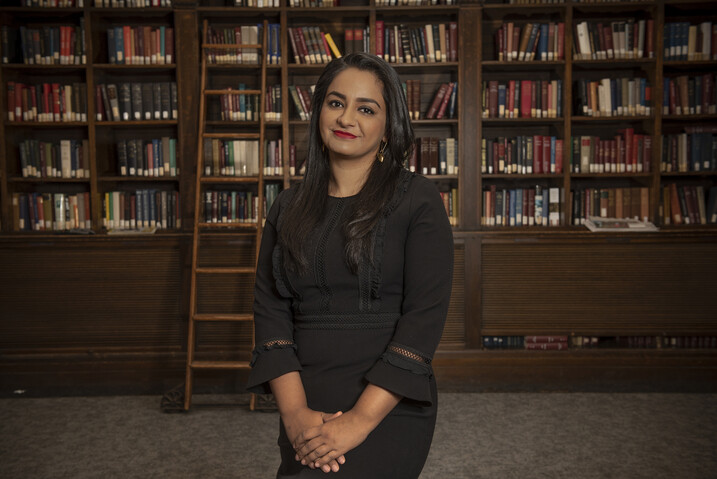
Teaching fellow Hardeep Dhillon, PhD ’21, stands out as an exemplar of empathy and active listening—skills that not only impress the faculty with whom she works but also shape their own approach in the classroom.
“I can say, truthfully, that she has transformed my teaching every bit as much as she has learned about teaching from me,” says Alison Johnson, professor of history and of Germanic languages and literatures who led the Department of History’s Colloquium on Teaching, which Dhillon participated in. “She taught me the importance of listening to the anxieties and concerns that lay behind student comments and—an even greater challenge—behind student silence. She taught me the importance of being transparently honest and detailed in feedback so that not only criticism but also praise can be taken seriously.”
Dhillon’s students have praised her teaching skills and intellectual rigor since her first forays into the classroom. “Hardeep has been a truly amazing section leader and one of my favorite teachers at college,” wrote one in an early evaluation of her teaching. “Her kindness creates an environment in which I felt comfortable enough to put forth ideas that may have not been fully formed, and she helped to guide discussions and push her students to think critically and deeper about the material.” Another student acknowledged Dhillon’s commitment to those in her sections. “She not only offers extensive feedback, but she always provides notice of when that feedback will come and why it is substantively the way it is.”
Dhillon’s skills earned her the History Prize Instructorship, the most coveted graduate teaching position in the Department of History, based on her design of the course Migrant Geographies: Between Asia and the United States in the Twentieth Century. When she taught the class during the fall 2020 term, Dhillon again received high marks from students. “She is an incredible historian, a deeply engaging instructor, and an incredibly understanding professor,” one wrote. “She teaches in a way that makes dense concepts incredibly accessible, all the while stimulating participation in a remote semester so effortlessly.”
Abigail Mariam: Co-Creating Beloved Community
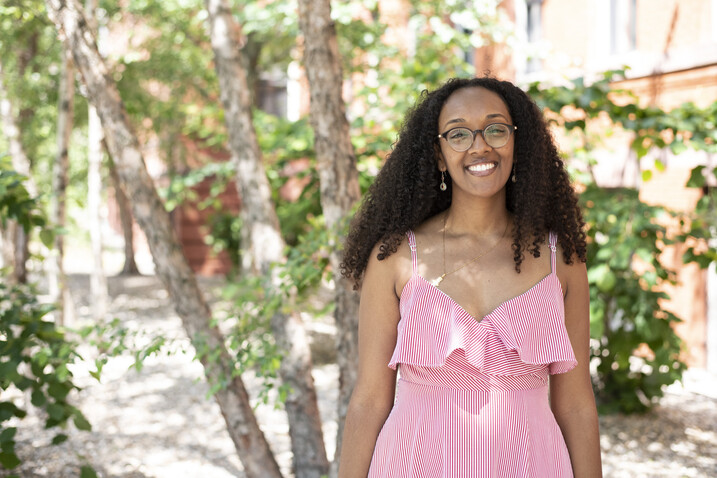
Both the instructors who have worked with Abigail Mariam and the undergraduates who have taken her classes agree that the PhD student in sociology and social policy has a gift for fostering community in the classroom.
“From my very first meeting with Abi, she immediately understood and valued my intention to help students build meaningful relationships with each other in order to help them deepen their learning, confront difficult structural realities, and grow as people in community,” says Matthew Lee, lecturer on sociology and lead instructor of the course Conflict, Justice, and Healing. “Her leadership was absolutely essential as we worked with students to co-create what some might call ‘beloved community.’”
Harvard’s PhD Program in Social Policy notes Mariam’s mix of intellectual drive and empathetic teaching style. “What distinguishes Abi as a teacher is her deeply-considered understanding of the purpose of learning, coupled with unusual wisdom, sensitivity, and compassion,” the program’s nomination reads. “We are especially struck by the profound sensibility of purpose Abi brings to her teaching.”
In evaluations, students describe Mariam as “kind,” “encouraging,” “insightful,” “passionate,” and “an amazing teacher.” “Any educator would be thrilled to be recognized for these characteristics,” says Henry Ford II Professor of the Social Sciences Robert Sampson in the Department of Sociology’s nomination letter. “In Abi’s case, these qualities were evident from her first semester of teaching.”
Mariam draws on the passion she has for the subject matter of Conflict, Justice, and Healing to engage students with the material. Undergraduate teaching evaluations describe the lasting impressions she leaves on participants in the course. “I am learning things I can carry into life beyond this class,” one student wrote. Mariam also receives high praise for her teaching skills. “She gives absolutely wonderful feedback,” wrote another student. “Her advice is extremely constructive, and she is just so kind. One of my favorite people in general.”
Manuel Meléndez-Sánchez: Empowering Lifelong Learners
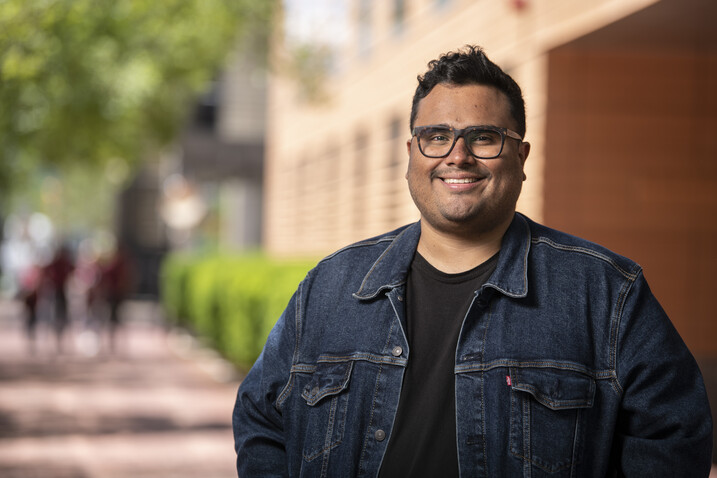
At a time when course instruction changed overnight, Manuel Meléndez-Sánchez stepped up to ensure that the transition to online teaching went as smoothly as possible, greatly exceeding the expectations of the Department of Government, and doing so with grace and good humor.
Meléndez-Sánchez was instrumental in assisting Steven Levitsky, David Rockefeller Professor of Latin American Studies, to redesign Gov 20, “Foundations of Comparative Politics,” for remote teaching. Together, they developed a new format, technologies, assignments, expectations, and support mechanisms, and Meléndez-Sánchez helped diversify course readings, particularly with respect to gender, an important priority within the department.
As head teaching fellow (TF), Meléndez-Sánchez also played, in Levitsky’s words, a “truly heroic role” in administering Gov 20, a challenging task in an ordinary year given the course’s size. He managed a large group of TFs, recommended asynchronous and synchronous teaching methods, and assisted in editing lecture videos. “The course ran almost seamlessly,” said Levitsky. “From the outside, and from the students’ perspective, the course may have looked simple and smooth-running. But this was precisely because of Meléndez-Sánchez’s creative and diligent work in the engine room.”
More important than the effort Meléndez-Sánchez dedicated to the course development and implementation were his teaching skills, which earned him a perfect Q score of 5.0. “I have never seen this before,” said Levitsky. “Manuel was organized, structured, and moderately demanding, but always engaged, accessible, and supportive. Students adored him—and crucially, they learned from him.”
Frances Hagopian, Jorge Paulo Lemann Senior Lecturer on Government, echoes Levitsky’s praise. “Manuel was, and is, not merely a supportive and conscientious TF,” she said. “He reaches every student in a way that empowers them to become budding scholars and sets them up to be lifelong learners. In the context of my regular meetings with students, the feedback I received about Manuel was unforgettable.”
Jacob Suissa: Mushroom Master
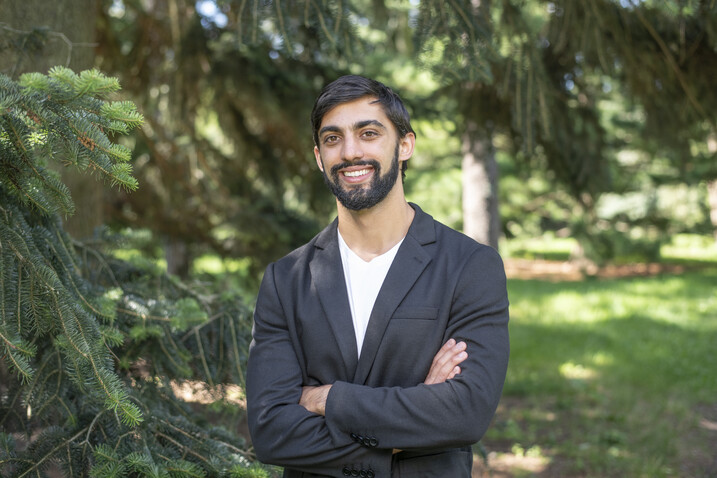
When learning moved online during spring 2020, teaching fellow Jacob Suissa partnered with Asa Gray Professor of Systematic Botany Donald Pfister to redesign the course Biology of Fungi and enable students to create their own mycology labs at home.
“As with all of us moving to online instruction, I went into the venture with some trepidation,” Pfister says. “After redesigning the course, I reviewed everything with Jacob. Together we evaluated the labs to determine what would work and what was likely to be a failure and should be eliminated. Important to us both was to establish personal contacts with our students. We wanted to be able to emulate a classroom experience via Zoom, to have good discussions, and to get to know the students. I could not have hoped for a more personable and dedicated partner in this venture.”
Suissa, a PhD candidate in organismic and evolutionary biology, took on management of the laboratory sessions, preparing at-home lab and mushroom growing kits and organizing all the materials for the course’s two student groups. With participants located throughout the world, Suissa devoted a day to lab meetings, holding office hours before and after in order to accommodate those in different time zones... “One of the goals was to help the students appreciate fungi wherever they happened to be,” says Pfister. “Jacob was able to share his own experience living in Hawaii with a student located there. Or to share what he had found on a weekend hike to encourage others to get out and look. He was able to direct students to aspects of fungal biology that were specific to their area.”
In a normal year, the class would participate in a “fungus fair” hosted by the Harvard Museum of Science and Culture. With the museum closed in response to the COVID-19 pandemic, the event went online, and students were asked to record short videos on a topic of their choosing. Suissa worked with course participants at a distance, enabling them to make successful presentations. “At the fair, Jacob assisted in managing questions from the public and most of all helped to make sure that none of the students were left in the lurch,” Pfister says. “I recently learned that the videos were being used by a class at Cornell to inspire their own projects. Jacob helped to make this venture run smoothly.”
Photos by Tony Rinaldo and Stu Rosner
Get the Latest Updates
Join Our Newsletter
Subscribe to Colloquy Podcast
Simplecast Stitcher





